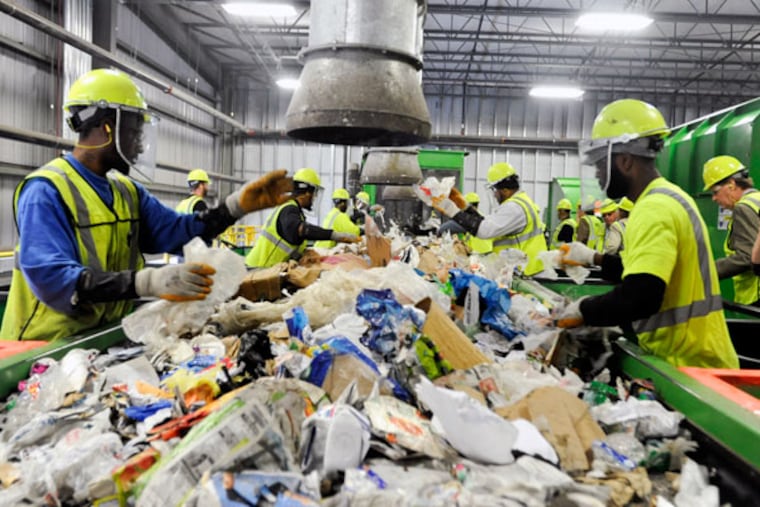After Philly Council passes, plastic bags still costly to clean up
Consumers who just can't get behind reusing grocery bags may have sighed with relief last week when an effort to charge Philadelphia shoppers a nickel each for plastic bags couldn't even get a hearing before City Council.

Consumers who just can't get behind reusing grocery bags may have sighed with relief last week when an effort to charge Philadelphia shoppers a nickel each for plastic bags couldn't even get a hearing before City Council.
So for now, at least, single-use plastic bags remain free at Philadelphia cash registers.
But that doesn't mean they are cost-free. Obviously, the bags cost merchants something, which is passed on to consumers. But depending on where discarded bags land, taxpayer-funded programs are often responsible for cleanup efforts.
Laws taxing and banning plastic bags have sprouted up all over the country. In August 2014, California became the first state to impose a statewide ban on plastic bags, and more than 190 cities and towns across the nation have laws regulating single-use shopping bags, often exempting restaurants and independent stores. Chicago's plastic bag ban will take effect on Aug. 1.
Every year, 101 billion plastic bags are pumped into the U.S. economy, each costing about a penny to make. About 12 percent are recycled, said Phil Rozenski, director of marketing and sustainability at Novolex, the largest U.S. plastic bag producer.
The rest wind up in landfills, as wadded up balls in closets and under kitchen sinks, or - worst of all - killing wildlife that ingest them, adorning trees, and clogging waterways.
And that is not free. "Plastic bags are the things that we spend time cleaning up," said Julie Slavet, executive director for the Tookany/Tacony-Frankford Watershed Partnership.
The plastic bags that Slavet sees are urban tumbleweeds, the fugitive sacks that end up on the street or in storm drains. And they translate into cleanup costs.
Austin, Texas, banned plastic bags in March 2013. Two years later, authorities found a 75 percent drop in plastic-bag consumption. They also saw more reusable bags in the litter and recycling streams. But overall "there was still a big reduction," said Aaron Waters, a research intern at Austin Resource Recovery.
And what about the plastic bags that are recycled? Can consumers feel good about those?
Not always.
"Many people don't know how to properly recycle a plastic bag," said Jon Roesser, general manager of Weavers Way Cooperative Association. You can't throw them into recycling bins with milk containers and the like. Bags must be taken to retail stores with take-back programs.
"Our facilities manager, who is also our environmental steward, is constantly fielding calls" about how to recycle plastic bags, he said. "They can't go into mixed-used recycling bins."
But they do, said Logan Welde, a staff attorney for the Clean Air Council. This occurs from the most well-off neighborhoods to the poorest ones, he said.
Discarded bags gum up the machinery at recycling plants, forcing workers to clear them by hand, which is costly and dangerous.
With proper recycling, "the facility would save so much money, and the city would wind up saving money, too," Welde said.
But proper bag recycling isn't free, either.
When consumers take their plastic bags back to retailers, the stores send them to distribution centers, where they are baled and sold back to plastic manufacturers for 8 to 15 cents a pound, Rozenski said. It's cheaper for bag makers to use recycled bags than virgin materials.
Both Rozenski and Gil Ziffer, a representative from A Bag's Life - which advocates proper plastic bag recycling - agree that big box retailers such as Walmart make money on these programs.
But as Ziffer said about labor for baling, "the consumer is eventually going to be the one that is paying for the cost of that. There's no question."
As for mom and pop stores, recycling bags probably costs more than it's worth, Rozenski said.
The question remains, how can we help our wallets and the environment? Besides correctly recycling, Ziffer said, "the best option is for people to reuse their plastic bags."
215-854-5502
@junglequeen18